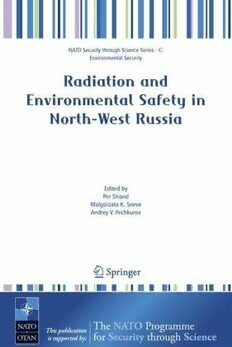Download Radiation and Environmental Safety in North-West Russia: Use of Impact Assessments and Risk Estimation (NATO Science for Peace and Security Series C: Environmental Security) PDF Free - Full Version
Download Radiation and Environmental Safety in North-West Russia: Use of Impact Assessments and Risk Estimation (NATO Science for Peace and Security Series C: Environmental Security) by Per Strand, Malgorzata K. Sneve, Andrey V. Pechkurov in PDF format completely FREE. No registration required, no payment needed. Get instant access to this valuable resource on PDFdrive.to!
About Radiation and Environmental Safety in North-West Russia: Use of Impact Assessments and Risk Estimation (NATO Science for Peace and Security Series C: Environmental Security)
The workshop attracted wide participation from relevant Russian and western organizations. International expertise from several related fields went together to produce a thorough understanding of the present status and how to develop the use of overall risk assessments and environmental impact assessments to ensure a sound use of resources when carrying out the tremendous work that must be carried out to clean up the cold war legacy. Important conclusions and recommendations have been produced and set out in the main report, providing a good basis for further development. Such development should note that safety and environmental performance can be addressed at three levels: Compliance-focused; Beyond compliance, towards best practice; and Continuous improvement. The aim is to progress from a) to b) and eventually reach c). The levels refer both to operators’ performance and regulators’ and other stakeholders’ expectations. Fundamentally, compliance cannot be achieved without the application of environmental impact assessment and risk assessment – to judge whether protection objectives have been met. Major progress has been made towards developing common methodologies, although there are still improvements to be made, including a common understanding of objectives and interpretation of results. In addition, improved assessment capabilities are required to help distinguish multiply characterised options within a process of options assessment. In turn, this has to rely on broader holistic understanding of the issues as well as wide stakeholder involvement. From the viewpoint of the proponents of any new development, the preparation of an environmental statement in parallel with project design provides a useful framework within which environmental considerations and design development can interact. Environmental analysis may indicate ways in which the project can be modified to avoid possible adverse effects, for example through considering more environmentally friendly alternatives. Taking these steps is likely to make the formal regulatory and planning approval stages run more smoothly.
Detailed Information
| Author: | Per Strand, Malgorzata K. Sneve, Andrey V. Pechkurov |
|---|---|
| Publication Year: | 2006 |
| ISBN: | 9781402046490 |
| Pages: | 311 |
| Language: | English |
| File Size: | 3.372 |
| Format: | |
| Price: | FREE |
Safe & Secure Download - No registration required
Why Choose PDFdrive for Your Free Radiation and Environmental Safety in North-West Russia: Use of Impact Assessments and Risk Estimation (NATO Science for Peace and Security Series C: Environmental Security) Download?
- 100% Free: No hidden fees or subscriptions required for one book every day.
- No Registration: Immediate access is available without creating accounts for one book every day.
- Safe and Secure: Clean downloads without malware or viruses
- Multiple Formats: PDF, MOBI, Mpub,... optimized for all devices
- Educational Resource: Supporting knowledge sharing and learning
Frequently Asked Questions
Is it really free to download Radiation and Environmental Safety in North-West Russia: Use of Impact Assessments and Risk Estimation (NATO Science for Peace and Security Series C: Environmental Security) PDF?
Yes, on https://PDFdrive.to you can download Radiation and Environmental Safety in North-West Russia: Use of Impact Assessments and Risk Estimation (NATO Science for Peace and Security Series C: Environmental Security) by Per Strand, Malgorzata K. Sneve, Andrey V. Pechkurov completely free. We don't require any payment, subscription, or registration to access this PDF file. For 3 books every day.
How can I read Radiation and Environmental Safety in North-West Russia: Use of Impact Assessments and Risk Estimation (NATO Science for Peace and Security Series C: Environmental Security) on my mobile device?
After downloading Radiation and Environmental Safety in North-West Russia: Use of Impact Assessments and Risk Estimation (NATO Science for Peace and Security Series C: Environmental Security) PDF, you can open it with any PDF reader app on your phone or tablet. We recommend using Adobe Acrobat Reader, Apple Books, or Google Play Books for the best reading experience.
Is this the full version of Radiation and Environmental Safety in North-West Russia: Use of Impact Assessments and Risk Estimation (NATO Science for Peace and Security Series C: Environmental Security)?
Yes, this is the complete PDF version of Radiation and Environmental Safety in North-West Russia: Use of Impact Assessments and Risk Estimation (NATO Science for Peace and Security Series C: Environmental Security) by Per Strand, Malgorzata K. Sneve, Andrey V. Pechkurov. You will be able to read the entire content as in the printed version without missing any pages.
Is it legal to download Radiation and Environmental Safety in North-West Russia: Use of Impact Assessments and Risk Estimation (NATO Science for Peace and Security Series C: Environmental Security) PDF for free?
https://PDFdrive.to provides links to free educational resources available online. We do not store any files on our servers. Please be aware of copyright laws in your country before downloading.
The materials shared are intended for research, educational, and personal use in accordance with fair use principles.

